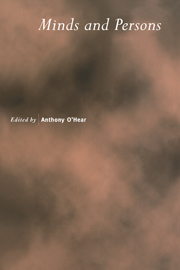Book contents
- Frontmatter
- Contents
- Preface
- Notes on Contributors
- Perceptual, Reflective and Affective Consciousness as Existence?
- The Domain of Folk Psychology
- Minds, Persons and the Unthinkable
- Moderately Massive Modularity
- A Theory of Phenomenal Concepts
- Free Will and the Burden of Proof
- Materialism and the First Person
- Language, Belief and Human Beings
- Human Minds
- Non-Personal Minds
- Personal Agency
- Mental Substances
- Mind and Illusion
- Index
The Domain of Folk Psychology
Published online by Cambridge University Press: 04 August 2010
- Frontmatter
- Contents
- Preface
- Notes on Contributors
- Perceptual, Reflective and Affective Consciousness as Existence?
- The Domain of Folk Psychology
- Minds, Persons and the Unthinkable
- Moderately Massive Modularity
- A Theory of Phenomenal Concepts
- Free Will and the Burden of Proof
- Materialism and the First Person
- Language, Belief and Human Beings
- Human Minds
- Non-Personal Minds
- Personal Agency
- Mental Substances
- Mind and Illusion
- Index
Summary
My topic in this paper is social understanding. By this I mean the cognitive skills underlying social behaviour and social coordination. Normal, encultured, non-autistic and non-brain-damaged human beings are capable of an impressive degree of social coordination. We navigate the social world with a level of skill and dexterity fully comparable to that which we manifest in navigating the physical world. In neither sphere, one might think, would it be a trivial matter to identify the various competences which underly this impressive level of performance. Nonetheless, at least as far as interpersonal interactions are concerned, philosophers show a rare degree of unanimity. What grounds our success in these interactions is supposed to be our common mastery of (more or less similar versions of) folk psychology.
Most philosophers would, I think, be inclined to agree on something like the following minimal characterization of folk psychology.
Human beings are social creatures. And they are reflective creatures. As such they continually engage in a host of cognitive practices that help them get along in their social world. In particular, they attempt to understand, explain and predict their own and others' psychological states and overt behaviour; and they do so by making use of an array of ordinary psychological notions concerning various internal mental states, both occurrent and dispositional. Let us then consider folk psychology to consist, at a minimum, of (a) a set of attributive, explanatory and predictive practices, and (b) a set of notions or concepts used in those practices.
(Von Eckhardt, 1994,)- Type
- Chapter
- Information
- Minds and Persons , pp. 25 - 48Publisher: Cambridge University PressPrint publication year: 2003
- 9
- Cited by

